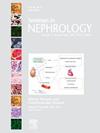衡量慢性肾脏病患者的社会功能。
IF 3.5
3区 医学
Q2 UROLOGY & NEPHROLOGY
引用次数: 0
摘要
社交功能是日常生活的一个重要方面,对于慢性肾脏病 (CKD) 患者及其护理人员来说非常重要。许多慢性肾脏病患者都会出现使人衰弱的症状并承受治疗负担,这可能会削弱他们的社会功能,从而影响整体社会健康。对于慢性肾脏病患者来说,症状(如疲劳和疼痛)、持续治疗(包括肾脏替代疗法)的负担以及药物副作用都会损害他们的社会功能。患者必须承担自我管理的责任,其中可能包括耗时的侵入性治疗(如透析),这会严重限制慢性肾脏病患者的社交功能。这可能会导致患者与家人、朋友、同龄人和同事等多个层面的社会关系不畅,并阻碍他们发展新的人际关系。据报道,社交功能较差的慢性肾功能衰竭患者的生活质量较差,心理健康也受到损害。许多慢性肾脏病患者依靠非正式的护理人员--通常是家人或朋友--来协助控制病情。这可能会给护理者带来压力,进一步限制患者和护理者建立社会联系的机会。尽管社会功能对慢性肾脏病患者的整体福祉至关重要,但临床上对其关注度仍然不足,而且评估社会功能的患者报告结果测量(PROM)也很有限。本文旨在定义社会功能,讨论社会功能对 CKD 患者及其护理者的影响,概述包含社会功能评估的 PROM,并讨论开发适当的 PROM 以测量 CKD 患者社会功能的注意事项。这将有助于为评估有关 CKD 患者社会功能的干预和护理提供信息。本文章由计算机程序翻译,如有差异,请以英文原文为准。
Measuring Social Functioning in Chronic Kidney Disease
Social functioning is a key aspect of daily life and is important to patients living with chronic kidney disease (CKD) and their caregivers. Many patients with CKD experience debilitating symptoms and treatment burden that can diminish their social functioning and thereby overall social health, which is the aspect of a person's well-being relating to their interactions and connections with others. In patients with CKD, symptoms (e.g., fatigue and pain), burden of ongoing treatments (including kidney replacement therapies), and medication side effects can impair social functioning. Having to manage responsibilities of self-management, which can include time-consuming and invasive treatments such as dialysis, can severely limit social functioning in patients with CKD. This can lead to poor social connections at many levels, including with family, friends, peers, and colleagues, and can hinder the development of new relationships. Patients with CKD with poorer social functioning have been reported to have worse quality of life and impaired mental health. Many patients with CKD rely on an informal caregiver—usually a family member or friend—to assist with management of their disease. This can place strain on the caregiver, further limiting opportunities for social connections for both the patient and caregiver. Although social functioning is critical for the overall well-being of patients with CKD, it remains underaddressed clinically, and patient-reported outcome measures (PROMs) to assess social functioning are limited. The objective of this article is to define social functioning, discuss the impacts of social functioning in patients with CKD and their caregivers, outline PROMs that have included assessment of social functioning, and discuss considerations in developing an appropriate PROM to measure social functioning in patients with CKD. This may help to inform the evaluation of interventions and care regarding social functioning within the CKD population.
求助全文
通过发布文献求助,成功后即可免费获取论文全文。
去求助
来源期刊

Seminars in nephrology
医学-泌尿学与肾脏学
CiteScore
5.60
自引率
0.00%
发文量
27
审稿时长
6-12 weeks
期刊介绍:
Seminars in Nephrology is a timely source for the publication of new concepts and research findings relevant to the clinical practice of nephrology. Each issue is an organized compendium of practical information that serves as a lasting reference for nephrologists, internists and physicians in training.
 求助内容:
求助内容: 应助结果提醒方式:
应助结果提醒方式:


